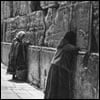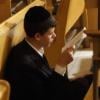Note: Special rules and certain variations apply if Tisha B’Av falls on Shabbat or Sunday. Click here for the details.
Afternoon of the 8th of Av
The restriction against studying Torah—other than sections that discuss the destruction of the Temples or other sad topics—commences at midday on the eve of the fast. With few exceptions, the prohibition continues until the end of the fast.
Tachanun (penitential prayer) is omitted from the afternoon prayer, as well as from all of the Tisha B’Av prayers.1
Shortly before the fast begins, we eat a “separation meal.” The final meal consists of a hard-boiled egg and a piece of bread dipped in ashesThis somber meal is not very plentiful—it follows a larger meal eaten a bit earlier. This final meal is eaten while sitting on the floor or a low stool. It consists of a piece of bread and a hard-boiled egg dipped in ashes, a symbol of mourning. (No zimmun is conducted when reciting the Grace After Meals.)
With sundown, all the laws of Tisha B’Av take effect.
Tisha B’Av Eve
In the synagogue, the curtain is removed from the ark, and the lights are dimmed. After the evening prayers, the book of Lamentations (Eichah) is read. The leader reads aloud, and the congregation reads along in an undertone (Eichah books, some with English translation and commentary, can be purchased at this link). In some communities (not Chabad), Lamentations is read by the leader from a parchment scroll.2
Lamentations is followed by the recitation of a few brief kinot (elegies) and the “V’Atah Kadosh” paragraph, followed by kaddish (minus the stanza beginning “Titkabel”3—which is also omitted from the kaddish recited at the end of the morning prayers).
Tisha B’Av Morning
When ritually washing your hands in the morning, pour water on your fingers only until the knuckle joints. While your fingers are still moist, you may wipe your eyes with them. It is not permitted to rinse out one’s mouth—or brush one’s teeth—until after the fast.
Considering that we don’t wear leather footwear on this day, the blessing “Who provided me with all my needs,” which primarily thanks G‑d for providing us with shoes, is omitted from the morning blessings.Tefillin are referred to as our “glory,” and on the Ninth of Av our glory is absent
Tallit and tefillin are not worn during the morning services. Tefillin are referred to as our “glory,” and on the Ninth of Av our glory is absent. Tzitzit are worn the entire day.
Those who follow Sephardic tradition insert the “Aneinu” passage in the Amidah. The priestly blessing is omitted from the cantor’s repetition.
The Torah reading in the morning is Deuteronomy 4:25–40, which speaks of the destruction of the Land of Israel. A chapter from Jeremiah (8:13–9:23), which also speaks of the destruction, is read as the haftorah.
After the morning prayers, it is customary to read the kinot elegies (kinot books, some with English translation and commentary, can be purchased at this link). The service then concludes with “Ashrei” and “Uva L’Tziyon” (omitting its second verse, “And this is My covenant”4) and “Aleinu.” The Song of the Day and “Ein K’Elokeinu” are omitted.
While quick tasks like flipping a light switch or a short drive are permitted, time-consuming labor is forbidden on Tisha B'Av morning except in cases of great need. After midday, work is permitted, but it is ideal not to work, as on this day, one’s focus should be on mourning and repentance.
It is customary to give additional charity on every fast day.
Tisha B’Av Afternoon
It is customary to wait until midday before starting the food preparations for the post-fast meal. The intensity of the mourning lessens in the afternoon, as is evident from the relaxing of certain restrictions.
After midday, it is once again permitted to sit on chairs and benches of regular height.Many have the custom to clean the house and wash the floors in anticipation of the Redemption
Many communities have the custom to clean the house and wash the floors after midday, in anticipation of the Redemption which we await.
In the synagogue, the ark’s curtain is restored to its place before the afternoon prayers.
Men don their tallit and tefillin in the afternoon. Before starting the afternoon prayers (wearing tallit and tefillin), it is customary to say those prayers omitted from the conclusion of the morning services.
The Torah is read before the Amidah. The reading is Exodus 32:11–14 and 34:1–10, which discusses how, in the aftermath of the Golden Calf incident, Moses successfully interceded on the Israelites’ behalf and attained forgiveness for their sin. After the afternoon Torah reading, the special fast-day haftorah, Isaiah 55:6–56:8, is read.
The sections of “Nachem” and “Aneinu” are added to the Amidah. (Note: “Aneinu” is recited only by those who are actually fasting.)
Post–Tisha B’Av
Before breaking the fast, one should perform netilat yadayim, this time covering the entire hand with water, but without reciting the blessing.
The Temple was set ablaze on the afternoon of the 9th of Av, and burned through the 10th. Therefore, the restrictions of the Nine Days (such as not eating meat, swimming, or laundering clothing) extend until midday of the 10th of Av.
However, if Tisha B’Av falls on a Thursday—in which case the 10th falls on Friday—one may do laundry, wash, and cut one’s hair on Friday morning in honor of the Shabbat.






Join the Discussion